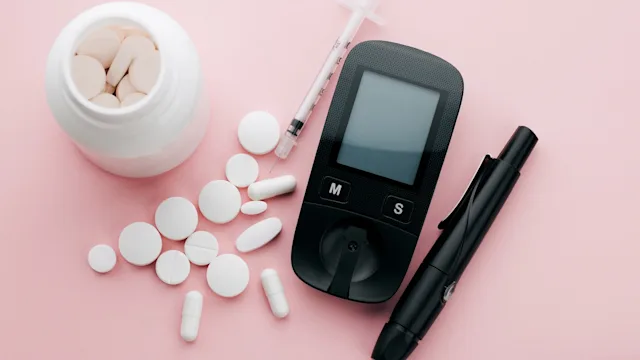Key takeaways:
Depression is a mood disorder that’s common in people with diabetes. It often goes undiagnosed and untreated.
People with diabetes are two to three times more likely to have depression than the general population.
Depression doesn’t usually go away on its own. And, without treatment, having depression can make it harder to manage diabetes.
You’ve likely heard of depression and diabetes. They’re both common medical conditions that affect millions of people around the world. But did you know they often go hand in hand?
Depression is especially common in people living with diabetes. In fact, people with diabetes are two to three times more likely to have depression than people without diabetes. And, unfortunately, less than 50% of people get the right diagnosis and treatment.
That’s why people who have diabetes need to know about depression. Let’s take a closer look at depression and diabetes, which symptoms to watch out for, and how to get help if you need it. After all, taking care of your mental health is a key part of managing your diabetes.
Why do people with diabetes have depression?
Compared with the general population, people with diabetes are more likely to become depressed. In fact, depression is twice as common in people with diabetes (Type 1 or Type 2) as compared to those without diabetes.
Research points to a two-way link between the two conditions. Diabetes-related complications tend to raise the risk of depression. And the opposite is true, too. People who have depression, have up to a 60 % higher risk of developing Type 2 diabetes.
How does diabetes cause depression?
It’s not clear. Researchers don’t know yet how — or even if — diabetes causes depression. But there might be common factors that increase the risk for both, including:
Your environment
Your culture and life experiences
Your lifestyle choices
Your immune system health
How your body manages stress
Your other medical conditions
Both diabetes and depression run in families. But, so far, researchers have not found a clear genetic link.
Lifestyle choices
Depression can make it harder for people with diabetes to maintain habits like exercising, eating a balanced and nutritious diet, and getting quality sleep. As a result, people with both diabetes and depression tend to have more difficulty managing their blood sugar and its complications. Plus, depression alone can affect lifestyle factors that increase the risk of developing Type 2 diabetes. According to research, people with depression tend to:
Do less physical activity
Have less nutritious eating habits
Smoke
Does positive thinking help diabetes? Read about how one man believes his positive mindset has helped his diabetes journey.
Feeling overwhelmed trying to manage your diabetes? Learn more about how diabetes distress is a common complication of diabetes
Diabetes doesn’t have to overtake your identity. A woman shares how she has learned to live with the diagnosis.
Another recent study also found that diets high in inflammatory foods were associated with more severe depression in people with diabetes.
The good news is that research shows that embracing certain lifestyle strategies can reduce the risk of Type 2 diabetes by as much as 90%. This includes:
Eating a balanced and nutritious diet
Doing regular physical activity
Avoiding smoking
Avoiding heavy alcohol use
- GlucophageMetformin
- RiometMetformin
- Glucophage XRMetformin ER (Glucophage XR)
Of course, these are lifestyle strategies that can also reduce your risk of depression. This can go a long way in reducing your risk of both diabetes and depression.
Does depression cause diabetes?
Not exactly — but depression is linked to a higher risk of developing Type 2 diabetes. People with depression often experience changes in:
Appetite
Energy
Sleep
Motivation
These shifts can make it harder to stay active, eat well, or keep up with preventive care. These depression-related changes can raise your diabetes risk over time.
There’s also evidence of a biological connection. Depression is associated with increased inflammation and elevated levels of stress hormones, like cortisol. Both of these can interfere with how your body processes insulin and increase the risk of diabetes. The good news? Treating depression, whether with therapy, medication, or lifestyle strategies, can help lower your diabetes risk, too.
Can diabetes affect your mental health?
Yes. Even if you’re not diagnosed with depression, living with diabetes can affect your mental health. After all, living with any long-term health condition can bring challenges. And with diabetes, keeping up with monitoring and self-care can be stressful.
There’s research to support this, too. One study found that women whose blood sugars went up and down had more negative moods and a lower quality of life. And there’s evidence that long-lasting (chronic) stress can affect mental and physical health.
What is ‘diabetes distress’?
Living with diabetes can feel overwhelming and even discouraging. If you sometimes feel this way, you’re not alone. There is a name for this experience: diabetes distress. It’s also sometimes called “diabetes burnout.” Up to half of people with diabetes will experience diabetes distress in an 18-month period.
Though it’s not the same as depression, diabetes distress can turn into depression in some people. And just like depression, diabetes distress can make it harder to take care of yourself and to manage your diabetes.
What are the symptoms of depression in people with diabetes?
Depression most commonly causes sadness and a loss of interest in things you once enjoyed. But it can also affect how you handle stress, interact with others, and care for yourself.
Common symptoms of depression include:
Feeling sad, empty, or irritable
Feeling less interest or enjoyment in your normal activities
Experiencing sleep changes
Having low energy
Having appetite changes
Feeling guilty or worthless
Having trouble concentrating
Having thoughts about death or suicide
People with diabetes who have depression might also:
Have a hard time caring for their diabetes needs
Not check their blood glucose regularly
Have more variability (highs and lows) in diabetes numbers
Have more episodes of severe hypoglycemia and/or diabetic ketoacidosis
Have an elevated A1C
Skip their diabetes medication
Can blood sugar changes make you feel depressed?
It’s not clear. There’s some evidence that blood sugar changes can affect mood. But that evidence isn’t conclusive.
In a small study of 20 people, participants with diabetes felt more depressed when they had hyperglycemia (high blood sugar). Some people with diabetes also report feeling less happy during a hypoglycemic episode (low blood sugar).
But here’s the truth: So far, there’s no clear link between mood and blood sugar in people with diabetes. More research is needed to understand whether there’s a connection.
How do you treat depression in people with diabetes?
In people with diabetes, treatment for depression is often a combination of:
Group therapy
Antidepressant medications
Managing your diabetes can also help your depression get better. This means treatment of depression in people with diabetes often includes:
Diabetes skills training
Diabetes peer support group
Changes to diabetes medications or management
Lifestyle changes
When should you get care for your mental health?
If you have diabetes and have symptoms of depression, talk with a healthcare professional. They can help you understand your symptoms and put together a care plan to help you feel better — both mentally and physically.
Remember: Depression is common in people with diabetes. It’s important to take action when feelings become overwhelming and cause you, or someone you care about, to feel run down and emotionally overwhelmed. By reaching out, you can get the support you need.
Where can you get support for diabetes and depression?
It can be hard to know where to turn for help if you, or a loved one, have depression and diabetes. Here are some options for finding more information and support:
The American Diabetes Association and American Psychology Association have a directory of healthcare professionals who are trained in mental health for people living with diabetes.
Breakthrough T1D (formerly known as JDRF) has an online portal with links to diabetes-related guidance and support that you may need. You’re only a click away.
Our GoodRx guide to diabetes support groups can help you find a place to share your experiences, learn from others, and get support — either in person or over the internet.
And remember: If you’re having thoughts of suicide, help is always available. Call the National Suicide Prevention Lifeline at 988 or text HOME to 741-741 to reach the Crisis Text Line.
The bottom line
Both diabetes and depression are common medical conditions. And the truth is, people with one are more likely to have the other. If you have diabetes, be sure to check in with a healthcare professional about mental health, especially if you’re feeling sad or overwhelmed. And remember that treating depression is one of the best things you can do for your long-term health, especially if you’re living with diabetes.

Why trust our experts?



References
American Diabetes Association. (n.d.). Mental health professional directory listing.
American Diabetes Association. (n.d.). Understanding diabetes and mental health.
Bădescu, S. V., et al. (2016). The association between diabetes mellitus and depression. Journal of Medicine and Life.
Bergmans, R. S., et al. (2020). Understanding the relationship between type 2 diabetes and depression: Lessons from genetically informative study designs. Diabetic Medicine.
Breakthrough T1D. (n.d.). Get personal support.
Centers for Disease Control and Prevention. (2024). Diabetes and mental health.
Diabetes UK. (n.d.). What is diabetes distress and burnout?
Gold, A. E., et al. (1997). Hypoglycaemia and non-cognitive aspects of psychological function in insulin-dependent (type 1) diabetes mellitus (IDDM). Diabetic Medicine.
Holt, R. I. G., et al. (2014). Diabetes and depression. Current Diabetes Reports.
Muijs, L. T., et al. (2021). Glucose variability and mood in adults with diabetes: A systematic review. Endocrinology, Diabetes & Metabolism.
National Institute of Diabetes and Digestive and Kidney Diseases. (2020). Diabetes distress and depression. National Institutes of Health.
Neuroscientifically Challenged. (n.d.). Know your brain: HPA axis.
Penckofer, S., et al. (2012). Does glycemic variability impact mood and quality of life? Diabetes Technology & Therapeutics.
Sommerfield, A. J., et al. (2004). Acute hyperglycemia alters mood state and impairs cognitive performance in people with type 2 diabetes. Diabetes Care.
Zheng, C., et al. (2024). Association between depression and diabetes among American adults using NHANES data from 2005 to 2020. Scientific Reports.














